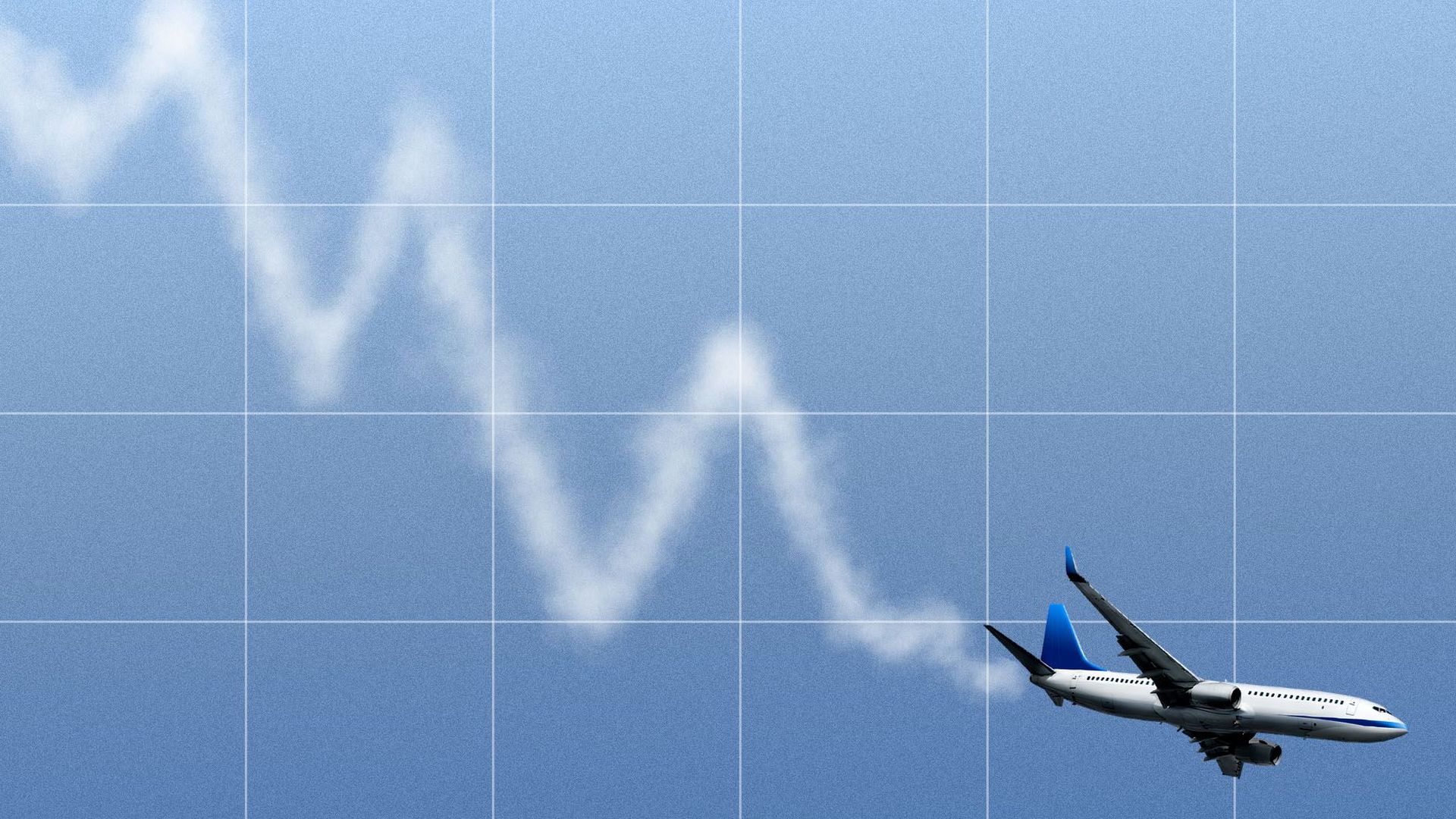| | | | | | | Presented By NetJets | | | | Axios Markets | | By Sam Ro ·Aug 09, 2021 | | Today's newsletter is 1,106 words, 4 minutes. 📈 of the day: $27 billion, Berkshire Hathaway's unrealized gains on its stock portfolio in Q2. | | | | | | 1 big thing: The jobs report was great, but... |  Data: Bureau of Labor Statistics, FRED; Chart: Axios Visuals The July U.S. jobs report was a blockbuster, with payrolls jumping and the unemployment rate falling by far more than expected. But there's still progress to be made in the labor market, and the recent spike in COVID-19 cases means it's too early to celebrate. Why it matters: The U.S. economy continues to show great momentum, which puts more pressure on the Federal Reserve to scale back its emergency monetary policies. - However, doing so too early risks having the economy backslide.
By the numbers: Employers added 943,000 jobs in July, which was considerably better than the 850,000 economists were expecting. - June and May numbers were revised up by a total of 119,000 jobs.
- Notably, the unemployment rate dropped to a pandemic-era low of 5.4% from 5.9% in June.
Yes, but: While the labor force participation rate climbed to 61.7% in July from 61.6% in June, it's still well below the pre-pandemic level of 63.3%. What they're saying: "The pandemic effects are still at play," Anu Gaggar, global investment strategist for Commonwealth Financial Network, tells Axios. - According to the Census Household Pulse Survey, 2.8 million Americans said they were not working because they were "concerned about getting or spreading the virus." These folks would boost the participation rate by a percentage point if they reentered the workforce.
Threat level: Economist Justin Wolfers noted that the July jobs report was based on a survey that reflects decisions made before the recent surge in COVID-19 cases. - Oxford Economics chief U.S. financial economist Kathy Bostjancic said, "The highly contagious delta variant casts a shadow on the labor market recovery in the coming months, threatening to slow the return of workers still on the sideline due to childcare issues or health concerns."
The bottom line: The July jobs report clearly shows that the U.S. economy was on a great trajectory. But it remains to be seen exactly how the new wave of infections is affecting activity. - Given that, it will be important to monitor future jobs report closely for any signs of a slowdown in the labor market recovery, Bank of America U.S. economist Joseph Song writes in a research note.
- "This will be critical for the Federal Reserve — [the jobs] report leaves September in play for a taper announcement but contingent on another very strong jobs report next month," Song says.
|     | | | | | | 2. Catch up quick | | Berkshire Hathaway bought back $6 billion worth of stock in Q2 as operating profits rose 21% from a year ago. (Reuters) Sanderson Farms is near a deal to sell itself for around $4.5 billion to Cargill and Continental Grain Co. (WSJ) A U.N. report warns the effects of climate change are more severe than previously thought and says human influence is "unequivocal." (Axios) |     | | | | | | 3. Airfare spending descent 🛩 |  | | | Illustration: Sarah Grillo/Axios | | | | Credit card transaction data suggest the recent surge in COVID-19 infections is starting to impact parts of the economy. Why it matters: The economy's been on a robust upward trajectory, generating almost a million jobs in July alone. - The big unknown is how much the spread of the Delta variant could derail that recovery.
What they're saying: Looking at Chase debit and credit card transaction data, JPMorgan economist Jesse Edgerton observed spending in travel and entertainment softened in early July as infections accelerated. - "Most notably, airline spending has fallen almost 20% from a recent peak in mid-July, a larger decline than during the severe winter COVID wave, when spending was at much lower levels," he wrote on Friday.
- Bank of America saw a similar pattern in its own debit and credit card data.
- "The slowing in air travel is not just a story for this week: the 2-year growth rate of air travel peaked four weeks ago and has taken a turn lower, potentially reflecting the risks from the Delta variant," the bank wrote on Thursday.
Zoom out: This is just one category of spending. In fact, Bank of America card spending levels for the week ending July 31 were 10% above 2019 levels. What to watch: The details of the July retail sales report bear watching when they're released on Aug. 17 for further clues about which categories are getting hit by the rise in infections. |     | | | | | | A message from NetJets | | Guaranteed access to your favorite destinations | | |  | | | | NetJets owns and operates the largest, most diverse fleet of private jets in the world. With access to 760+ aircraft reaching 5,000+ airports across the world, safe and reliable travel has never been easier. Find the perfect aircraft for you. | | | | | | 4. Cars are back to being depreciating assets 📉 |  Data: Manheim; Chart: Axios Visuals Used car prices continue to descend from their eye-popping levels. Why it matters: Protracted supply chain issues caused a shortage of new cars, and in turn used cars, as demand boomed. By the numbers: According to the Manheim Used Vehicle Value Index, the wholesale price — or the price used car dealers pay — in July fell by 2.6% from June. This follows a 1.3% decline the month prior. What they're saying: Now that wholesale prices have edged down for two months, consumers should start to see prices normalize at the retail level, which is what a consumer pays a dealer for a used car. - "Retail prices typically follow wholesale prices by about six weeks because many dealers price inventory based on cost," Cox Automotive chief economist Jonathan Smoke tells Axios. "We've observed retail prices rolling over in July—precisely 6 weeks after wholesale prices started to fall."
Yes, but: Don't expect prices to tumble. - "I think consumers will notice that prices are no longer going up, but retail prices are sticky and likely won't fall as fast as wholesale prices," Smoke says. "That said, we are not expecting any price corrections. We still have low inventories and extremely low inventory of new, which drives up demand for used."
What to watch: Upcoming consumer price updates could begin to reflect the cooling in prices. The July CPI report will be released on Aug. 11. The bottom line: "No one should expect a bargain on a car any time soon, but what we can expect is no more abnormal appreciation," Smoke says. - "Vehicles are a depreciating asset," he adds.
|     | | |  | | | | If you like this newsletter, your friends may, too! Refer your friends and get free Axios swag when they sign up. | | | | | | | | 5. A pandemic roundtrip |  Data: FactSet; Chart: Axios Visuals In 2019, Wall Street's forecasters had high hopes for 2021 earnings. But when the pandemic hit, those expectations collapsed. Why it matters: Expected earnings are the key driver of stock prices in the long run. By the numbers: Back in August 2019, analysts estimated that S&P 500 earnings per share would rise to $198 in 2021, according to FactSet. - They revised those estimates down to a low of about $161 in June 2020.
- As of Aug. 5, that estimate returned to $198.08.
The big picture: Unfortunately, it's incredibly difficult to accurately predict the future. Even when they're looking six months out, Wall Street's professional forecasters are often off target. The bottom line: There's a reason better-than-expected earnings are called an earnings "surprise." |     | | | | | | A message from NetJets | | Connecting you to what matters most | | |  | | | | No lengthy layovers, security screenings, and baggage claim. Continue your workday in-flight, visit multiple destinations in one day — and still get home in time for dinner. Here's how: NetJets will get you there. Learn more about the benefits of NetJets. | | |  | | It'll help you deliver employee communications more effectively. | | | | | | Axios thanks our partners for supporting our newsletters. If you're interested in advertising, learn more here.
Sponsorship has no influence on editorial content. Axios, 3100 Clarendon Blvd, Suite 1300, Arlington VA 22201 | | | You received this email because you signed up for newsletters from Axios.
Change your preferences or unsubscribe here. | | | Was this email forwarded to you?
Sign up now to get Axios in your inbox. | | | | Follow Axios on social media:    | | | | | |











No comments:
Post a Comment